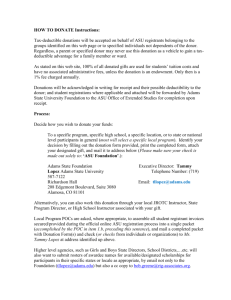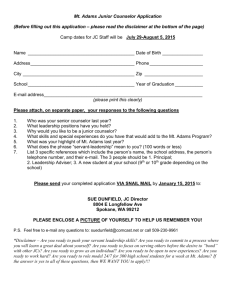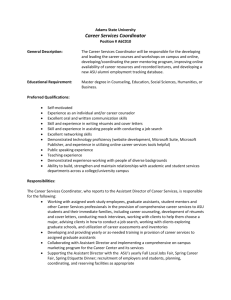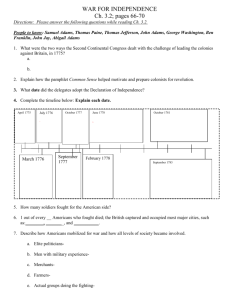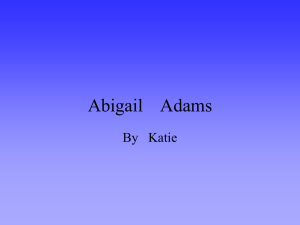Courier compilation CHE article
advertisement
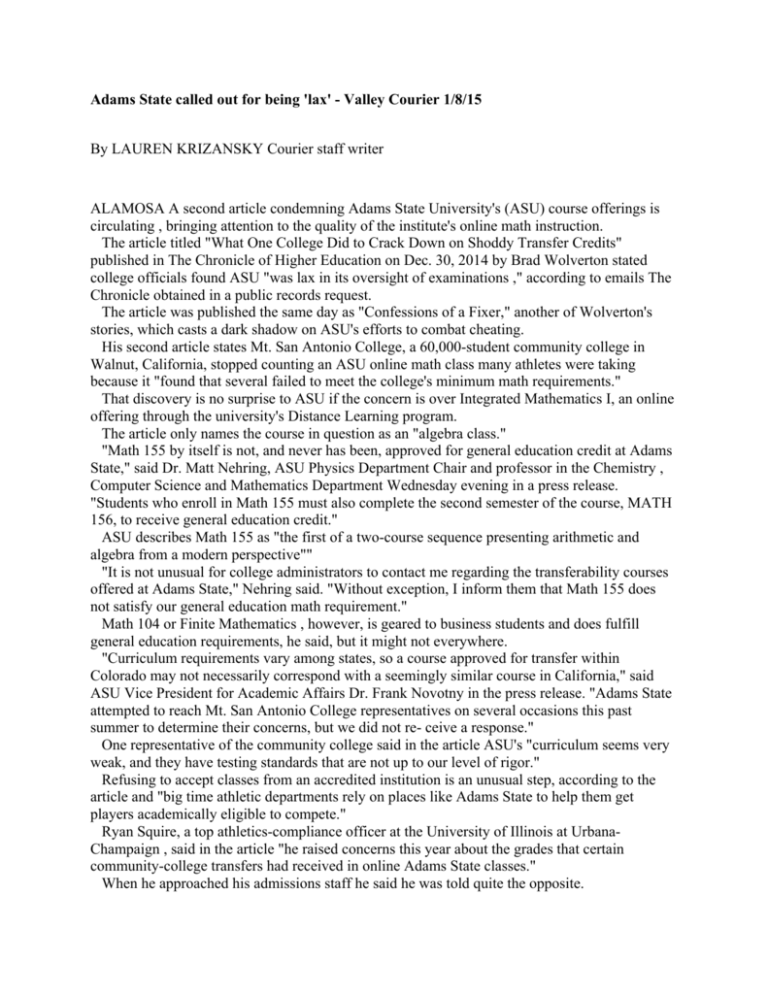
Adams State called out for being 'lax' - Valley Courier 1/8/15 By LAUREN KRIZANSKY Courier staff writer ALAMOSA A second article condemning Adams State University's (ASU) course offerings is circulating , bringing attention to the quality of the institute's online math instruction. The article titled "What One College Did to Crack Down on Shoddy Transfer Credits" published in The Chronicle of Higher Education on Dec. 30, 2014 by Brad Wolverton stated college officials found ASU "was lax in its oversight of examinations ," according to emails The Chronicle obtained in a public records request. The article was published the same day as "Confessions of a Fixer," another of Wolverton's stories, which casts a dark shadow on ASU's efforts to combat cheating. His second article states Mt. San Antonio College, a 60,000-student community college in Walnut, California, stopped counting an ASU online math class many athletes were taking because it "found that several failed to meet the college's minimum math requirements." That discovery is no surprise to ASU if the concern is over Integrated Mathematics I, an online offering through the university's Distance Learning program. The article only names the course in question as an "algebra class." "Math 155 by itself is not, and never has been, approved for general education credit at Adams State," said Dr. Matt Nehring, ASU Physics Department Chair and professor in the Chemistry , Computer Science and Mathematics Department Wednesday evening in a press release. "Students who enroll in Math 155 must also complete the second semester of the course, MATH 156, to receive general education credit." ASU describes Math 155 as "the first of a two-course sequence presenting arithmetic and algebra from a modern perspective"" "It is not unusual for college administrators to contact me regarding the transferability courses offered at Adams State," Nehring said. "Without exception, I inform them that Math 155 does not satisfy our general education math requirement." Math 104 or Finite Mathematics , however, is geared to business students and does fulfill general education requirements, he said, but it might not everywhere. "Curriculum requirements vary among states, so a course approved for transfer within Colorado may not necessarily correspond with a seemingly similar course in California," said ASU Vice President for Academic Affairs Dr. Frank Novotny in the press release. "Adams State attempted to reach Mt. San Antonio College representatives on several occasions this past summer to determine their concerns, but we did not re- ceive a response." One representative of the community college said in the article ASU's "curriculum seems very weak, and they have testing standards that are not up to our level of rigor." Refusing to accept classes from an accredited institution is an unusual step, according to the article and "big time athletic departments rely on places like Adams State to help them get players academically eligible to compete." Ryan Squire, a top athletics-compliance officer at the University of Illinois at UrbanaChampaign , said in the article "he raised concerns this year about the grades that certain community-college transfers had received in online Adams State classes." When he approached his admissions staff he said he was told quite the opposite. "The university didn't have the ability to reject the credits," Squire told The Chronicle. ASU doesn't agree. "Institutions are not required to accept credits from another institution just because the sending institution is accredited," countered the university in the press release. "For this reason, Colorado established the guaranteed transfer (gt) Pathways General Education Curriculum. These courses meet state-wide standards and are approved for general education credit transfer to any two or four-year public institution in Colorado." Institutions are prevented from determining whether the student registering for a course is an athlete or not, and NCAA regulations maintain student athletes cannot be treated differently from other students. See the Fri. Jan. 2 Valley Courier edition to read ASU's response to the cheating allegations . Rigging the game – Valley Courier 1/13/15 Virginia Simmons From the White Sox at Chicago in 1919 to "Mr. White" at ASU, the ways to rig sports are countless. So too are the crooks. There are unforgettable big names of individuals like Mike Tyson, Barry Bonds, Pete Rose, Lance Armstrong, Marion Jones, Tanya Harding, a n d S t e e l e r s ' coach Mike Toml i n , a n d t h e r e also are famous financial swindlers like Frank Abagnale , the original Charles Ponzi, and Bernie Madoff. Space doesn't allow the long list of famous and infamous people who have stolen the written work of others and called it their own from Aristotle, Doris Kearns Goodwin, Joe Biden, and Barack Obama, down to Ward Churchill at CU. There are plenty of big institutions of higher learning, like the University of North Carolina, rigging the game of college sports. Some recruits are capable of performing college-level studies, but others clearly are not without the help of shadowy characters like "Mr. White." But how did a little school like ASU out in the boonies (who ever heard of Adams State before this?) get mixed up in a racket like this one? It was easy, as easy as looking the other way. These so-called "student athletes" sneak in the back door, maybe even get a degree. Then some of them even have the gall to try to parlay a B.A. into a graduate degree besides. Brad Wolverton's article describing the shenanigans appeared in "What One College Did to Crack Down on Shoddy Transfer Credits," in "Chronicle of Higher Education" (Dec. 30, 2014). Sports surely was not what Adams State Normal School had in mind when it was created. It was education. Unfortunately, the institution seems to have forgotten to keep its eye on its original goal, where the majority of its students, faculty, and many supporters still believe it should be. While reading the latest issue of "AStater ," just before this dismal news broke, I was once again impressed by the high quality of the alumni magazine, its news, its writing, and its design. It gave welldeserved recognition to several excellent programs and outstanding individuals which represent the best that the college offers. Now many of us will be dismayed to learn elsewhere about some unworthy activities associated with the school. ASU surely is not alone in contending with problems in college sports, and on-line courses especially can bring not only positive opportunities but negative abuses in all its programs. A perpetual issue in any school, on line or off it, is moral integrity and simple honesty , with cheating too often accepted as "the way things are done." My hat is off to any teacher, administrator, or parent who thinks otherwise and demands the best for and from its students. Compromising can occur not only in sports but in any other activity. I myself have been plagiarized by a faculty member at the college (who should have been fired but wasn't because that would have rattled an apple cart), and by ASC grad in journalism who was fired from her newspaper job after she blatantly plagiarized my work (she must have been pretty stupid besides), not to mention a host of other episodes elsewhere during my long career. In those two long-ago incidents in Alamosa that I have mentioned, both individuals could have been sued but were not, as I now say with regret because dishonesty should be exposed publicly wherever it exists. In present-day society, with corruption existing everywhere, no one should be surprised to learn that college sports programs are prime targets, even out in the boonies where we thought no one would notice what was going on. Well, folks, it looks like we have been noticed at last. ASU issues need exact action – Valley Courier 1/17/15 Lance Hostetter "As he directed more of his business to Adams State, Mr. White says, he sought to build connections on the inside." The article from the Chronicle on Higher Education paints an ugly image for Adams State University, really ugly. The article outlines the work of "Mr. White" who helps student-athletes meet academic requirements in order to remain eligible for athletic participation. The scope of Mr. White's work allegedly reaches far beyond Adams State and could reach the National Basketball Association and Major League Baseball. As it's told, Division I athletes are directed to the Adams State Extended Studies program because the "classes were so easy, Mr. White says, he hardly needed the test keys." The report details multiple issues including duping an Adams State employee, exposing the alleged ease of the Extended Studies program, and the ease to which Mr. White was able to obtain student information. These are not small allegations. Instead, these are serious allegations that could be met with serious consequences. Adams State President David Svaldi, though, has taken swift and exact action by freezing new enrollments to its print-based correspondence courses and ordering an external review of the student verification process. These are necessary moves and should prove beneficial to the future direction of the Extended Studies program at Adams State. This is not enough, however. As the Chronicle suggested, we live in an age when cyber security is a major concern. It's imperative that Adams State take the necessary steps to insure that students' information is not being released to outside sources. The ease at which Mr. White obtained access to student profiles is extremely alarming. Adams State is responsible for the safety of its students and students' information . The university must take steps to ensure student information is not compromised. Secondly, if the report accurately depicts some Adams State test questions, this is an issue. Testing is to gauge student knowledge and aptitude in the subject area. The questions highlighted in the Chronicle article are embarrassing. Adams State needs to ensure that its academic integrity is upheld. I graduated from Adams State in 2011, and I love the college. I remember the courses I took to be challenging, and I never believed that my information would be compromised. But, I was never a part of the Extended Studies program. Distance learning, as the Chronicle calls it, is a growing reality in today's world of higher education. It would behoove Adams State to rectify the issues outlined in the Chronicle. Adams State has a growing presence in Colorado higher education, and rightfully so. But, if academic integrity is not upheld and student information is easily accessed by outside "hackers" that presence will dissipate quickly. As an Adams State alumnus and supporter, I hope this will only be a hiccup in time and not a precursor to more issues. Opinion Column 1/19/15 By Dr. David Svaldi, President, Adams State University It is heartening to know that many share my revulsion over the academic fraud committed against Adams State University that is detailed in a recent Chronicle of Higher Education article. However, I must correct some statements made by Valley Courier columnist Lance Hostetter. He wrongly assumes that Adams State’s student information was hacked. No one has questioned the integrity of our student data system. In reality, the “fixer” interviewed by the Chronicle obtained student information directly from the student-athletes themselves. The “fixer,” referred to only as “Mr. White” in the article, went into business to cheat on behalf of student athletes who were not academically eligible to compete, according to NCAA regulations. The following is an excerpt from the Chronicle article: “Among his files is a pink steno pad of names, covering the front and back of 80 pages, that includes some of the biggest stars in college sports. Next to the names are credit-card numbers and PINs, log-ins, passwords, Social Security numbers, and addresses. . . . Over the past 14 years, he says, he has used test keys to cheat for hundreds of athletes, helping them meet the eligibility requirements of the National Collegiate Athletic Association. For some players, he says, he did their work outright. For others, he provided homework answers and papers that the students would submit themselves. At exam time, he lined up proctors and conspired with them to lie on behalf of students. Many times, he says, the players’ coaches directed athletes his way. Sometimes, players’ parents or handlers arranged the details.” In recent years, Adams State revised distance education policies to prevent cheating. For example, in accordance with industry best practices, we conduct online proctoring, in which a webcam captures an image of the student’s government-issued ID; authentication is confirmed through a national database. For courses that require face-to-face proctoring, we coordinate only with testing centers, librarians, clergy, military education staff, and other trustworthy entities. We do not permit coaches or athletic administrators to proctor exams. In light of the Chronicle report, Adams State suspended new enrollments in print-based correspondence courses. We will work with our accrediting agency, the Higher Learning Commission (HLC), and engage external evaluators to review our student verification process and other distance education policies and procedures. We will implement state-of-the-art recommendations that preserve and guarantee academic integrity and will discontinue any delivery method or course that is weak in that regard. Hostetter also questions the rigor of Adams State courses. I assure our students, past, present, and future, that all Adams State University coursework meets the standards set by our faculty, the state, and HLC. Our online courses mirror their on-campus counterparts and are reviewed every three years by the respective academic department. Our accreditation remains intact and is not in jeopardy. Adams State assures the validity of our Extended Studies program and will improve processes to best serve students who otherwise would not be able to further their education, due to geographic isolation or the demands of work and family responsibilities.


